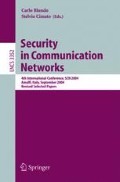Abstract
In this paper, we revisit the security notions for public-key encryption, and namely indistinguishability. We indeed achieve the surprising result that no decryption query before receiving the challenge ciphertext can be replaced by queries (whatever the number is) after having received the challenge, and vice-versa. This remark leads to a stricter and more complex hierarchy for security notions in the public-key setting: the (i,j)-IND level, in which an adversary can ask at most i (j resp.) queries before (after resp.) receiving the challenge. Excepted the trivial implications, all the other relations are strict gaps, with no polynomial reduction (under the assumption that IND-CCA2 secure encryption schemes exist.) Similarly, we define different levels for non-malleability (denoted (i,j)-NM.)
Access this chapter
Tax calculation will be finalised at checkout
Purchases are for personal use only
Preview
Unable to display preview. Download preview PDF.
References
Bellare, M., Desai, A., Jokipii, E., Rogaway, P.: A Concrete Security Treatment of Symmetric Encryption: Analysis of the DES Modes of Operation. In: Proc. of the 38th FOCS. IEEE, New York (1997)
Bellare, M., Desai, A., Pointcheval, D., Rogaway, P.: Relations among Notions of Security for Public-key Encryption Schemes. In: Krawczyk, H. (ed.) CRYPTO 1998. LNCS, vol. 1462, pp. 26–45. Springer, Heidelberg (1998)
Bellare, M., Rogaway, P.: The Exact Security of Digital Signatures – How to Sign with RSA and Rabin. In: Maurer, U.M. (ed.) EUROCRYPT 1996. LNCS, vol. 1070, pp. 399–416. Springer, Heidelberg (1996)
Bellare, M., Sahai, A.: Non-malleable encryption: Equivalence between two notions, and an indistinguishability-based characterization. In: Wiener, M. (ed.) CRYPTO 1999. LNCS, vol. 1666, pp. 519–536. Springer, Berlin (1999)
Dolev, D., Dwork, C., Naor, M.: Non-Malleable Cryptography. In: Proc. of the 23rd STOC. ACM Press, New York (1991)
Dolev, D., Dwork, C., Naor, M.: Non-Malleable Cryptography. SIAM Journal on Computing 30(2), 391–437 (2000)
Goldreich, O., Goldwasser, S., Micali, S.: How to construct random functions. Journal of the ACM 33(4), 210–217 (1986)
Goldwasser, S., Micali, S.: Probabilistic Encryption. Journal of Computer and System Sciences 28, 270–299 (1984)
Goldwasser, S., Micali, S., Rackoff, C.: The Knowledge Complexity of Interactive Proof Systems. In: Proc. of the 17th STOC, pp. 291–304. ACM Press, New York (1985)
Goldwasser, S., Micali, S., Rivest, R.: A “Paradoxical” Solution to the Signature Problem. In: Proc. of the 25th FOCS, pp. 441–448. IEEE, New York (1984)
Goldwasser, S., Micali, S., Rivest, R.: A Digital Signature Scheme Secure Against Adaptative Chosen-Message Attacks. SIAM Journal of Computing 17(2), 281–308 (1988)
Naor, M., Yung, M.: Public-Key Cryptosystems Provably Secure against Chosen Ciphertext Attacks. In: Proc. of the 22nd STOC, pp. 427–437. ACM Press, New York (1990)
Ohta, K., Okamoto, T.: On Concrete Security Treatment of Signatures Derived from Identification. In: Krawczyk, H. (ed.) CRYPTO 1998. LNCS, vol. 1462, pp. 354–369. Springer, Berlin (1998)
Phan, D.H., Pointcheval, D.: On the Security Notions for Public-Key Encryption Schemes. In: Blundo, C., Cimato, S. (eds.) SCN 2004. LNCS, vol. 3352, pp. 33–46. Springer, Berlin (2004), Full version available from, http://www.di.ens.fr/users/pointche/
Rackoff, C., Simon, D.R.: Non-interactive Zero-knowledge Proof of Knowledge and Chosen Ciphertext Attack. In: Feigenbaum, J. (ed.) CRYPTO 1991. LNCS, vol. 576, pp. 433–444. Springer, Heidelberg (1992)
Sahai, A.: Non-Malleable Non-Interactive Zero-Knowledge and Chosen-Ciphertext Security. In: Proc. of the 40th FOCS. IEEE, New York (1999)
Author information
Authors and Affiliations
Editor information
Editors and Affiliations
Rights and permissions
Copyright information
© 2005 Springer-Verlag Berlin Heidelberg
About this paper
Cite this paper
Phan, D.H., Pointcheval, D. (2005). On the Security Notions for Public-Key Encryption Schemes. In: Blundo, C., Cimato, S. (eds) Security in Communication Networks. SCN 2004. Lecture Notes in Computer Science, vol 3352. Springer, Berlin, Heidelberg. https://doi.org/10.1007/978-3-540-30598-9_3
Download citation
DOI: https://doi.org/10.1007/978-3-540-30598-9_3
Publisher Name: Springer, Berlin, Heidelberg
Print ISBN: 978-3-540-24301-4
Online ISBN: 978-3-540-30598-9
eBook Packages: Computer ScienceComputer Science (R0)

